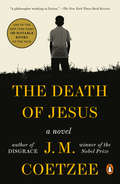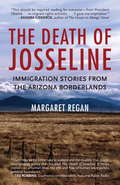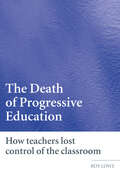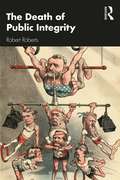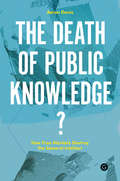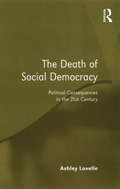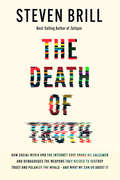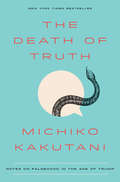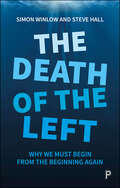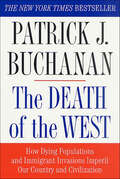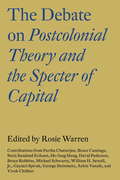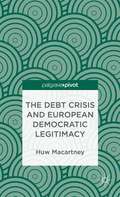- Table View
- List View
The Death of Jesus: A Novel
by J. M. CoetzeeAfter The Childhood of Jesus and The Schooldays of Jesus, the Nobel prize-winning author completes his haunting trilogy with a new masterwork, The Death of JesusIn Estrella, David has grown to be a tall ten-year-old who is a natural at soccer, and loves kicking a ball around with his friends. His father Simón and Bolívar the dog usually watch while his mother Inés now works in a fashion boutique. David still asks many questions, challenging his parents, and any authority figure in his life. In dancing class at the Academy of Music he dances as he chooses. He refuses to do sums and will not read any books except Don Quixote.One day Julio Fabricante, the director of a nearby orphanage, invites David and his friends to form a proper soccer team. David decides he will leave Simón and Inés to live with Julio, but before long he succumbs to a mysterious illness. In The Death of Jesus, J. M. Coetzee continues to explore the meaning of a world empty of memory but brimming with questions.
The Death of Josseline: Immigration Stories from the Arizona Borderlands
by Margaret ReganDrawing from her 10 years reporting on the US-Mexico border, Regan, a journalist who writes for the Tucson Weekly and other publications, presents the stories of migrants from northern Mexico who came into the US through the Tucson Sector of Arizona after urban crossings became increasingly patrolled. She relates how 14-year-old Josseline Hernández left with her younger brother in a group heading to Los Angeles, but became ill from prolonged exposure and was left in the desert to die by her guide. Regan explores her and other migrant deaths in the Arizona desert between 2001 and 2009, drawing from interviews with migrants, the Border Patrol, vigilantes, members of the human rights group No More Deaths, and Tohono O'odham tribal members, on whose land 83 bodies were found, to elucidate the problem. There is no index or bibliography. Annotation ©2010 Book News, Inc. , Portland, OR (booknews. com)
The Death of Liberalism
by R. Emmett TyrrellThe grave is dug, the headstone carved, the hearse idling out front. A once-potent political and cultural scourge of our time, Liberalism, is breathing its last?and loudest?breaths.In this provocative postmortem, R. Emmett Tyrrell, Jr. traces the dubious rise and inevitable fall of the deeply flawed Liberal-Progressive movement, which has culminated in the nation's first stealth socialist, President Barack Obama?the unwitting pallbearer for American Liberalism. While exposing this nonsensical worldview, Tyrrell also winsomely reaffirms the timeless values Liberalism has endeavored to undermine: free enterprise, personal liberty, limited government, empiricism, reason, and common sense. Ultimately, Tyrrell welcomes conservatives, moderates, independents, and the heretofore apolitical to step forward at this crucial juncture, and take the final steps necessary to administer Liberalism's last rites. "From Harry Truman to Ed Koch to McGovern, Liberalism has been in decline. With Obama, Liberalism is dead. Now comes Crony Capitalism. This is a hilarious and profound book?especially because Tyrrell sees the value of Fox News nd Talk Radio." ?Sean Hannity, author of Conservative Victory, and radio host of The Sean Hannity Show and Fox News Channel's Hannity."R. Emmett Tyrrell . . . chronicles with growing joyfulness the high points of Liberalism's demise until we get to 2010 and Liberalism's lurch into the grave. . . A wonderful read and a fitting send-off to a very dreary ideology." ?Mark Levin, host of The Mark Levin Radio Show and author of the bestsellers Liberty and Tyranny and Ameritopia"The Death of Liberalism is a dashing, sharp, well-argued and succinct tract for the times. Mr. Tyrrell is a controversialist of stature, a polemicist of robust energy and a man who knows how to present his case with power and precision."?Paul Johnson, author of Modern Times, Intellectuals, and A History of the American People
The Death of Lincoln: A Picture History of the Assassination
by Leroy HaymanAn account of the events leading to the assassination of Lincoln as well as the arrest, trial and punishment of the accused.
The Death of Outrage: Bill Clinton and the Assault on American Ideals
by William J. BennettToday we see little public outrage about Bill Clinton's misconduct. With enormous skill, the president and his advisors have constructed a defensive wall built of bricks left over from Watergate: diversion, half-truth, equivocation, and sophistry. It is a wall that has remained unbreached. Until now. In The Death of Outrage: Bill Clinton and the Assault on American Ideals, former cabinet secretary and bestselling author William J. Bennett dismantles the president's defenses, brick by evasive brick, and analyzes the meaning of the Clinton scandals: why they matter, what the public reaction to them means, and the social and political damage they have already inflicted on America. For, despite Bill Clinton's position in public opinion polls, the most persuasive public arguments made by the president's supporters wither under the clear light of moral reason and common sense. The Death of Outrage exposes the fallacious and demeaning logic that argues our economic well-being is the only important measure of presidential performance; torpedoes the deep but wholly unexamined respect for European sophistication about "private matters"; and explains why the president's troubles are not the result of a "vast, right-wing conspiracy," but are the result of his own doings. The Death of Outrage shows How the president's actions, far from being irrelevant to the conduct of his affairs, have severely restricted his ability to govern. The unprecedented recklessness of the Clinton administration in everything from influence peddling to sexual misconduct to alarming tactics of intimidation. How the president and his defenders have exploited the natural tolerance of the American people -- and made a mockery of the rule of law. Why the Clinton scandals -- from the Travel Office, to Filegate, to the Rose Law Firm billing records, to the Lewinsky Affair -- are neither a creation of the tabloid press, nor independent of one another. Bill Bennett explains why presidential character matters; why allegations of sexual misconduct need to be taken seriously; why reasoned judgment is the mark of a healthy democracy; and why the ends don't justify the means. Explosive and hard-hitting, powerful in its logic, carefully reasoned in its conclusions, The Death of Outrage is directed at a shameful chapter of American history. It is an urgent call for American citizens to repudiate the deep corruption of Bill Clinton, and the corrupting arguments made in his defense.
The Death of Politics: How to Heal Our Frayed Republic After Trump
by Peter WehnerThe New York Times opinion writer, media commentator, outspoken Republican and Christian critic of the Trump presidency offers a spirited defense of politics and its virtuous and critical role in maintaining our democracy and what we must do to save it before it is too late. “Any nation that elects Donald Trump to be its president has a remarkably low view of politics.” Frustrated and feeling betrayed, Americans have come to loathe politics with disastrous results, argues Peter Wehner. In this timely manifesto, the veteran of three Republican administrations and man of faith offers a reasoned and persuasive argument for restoring “politics” as a worthy calling to a cynical and disillusioned generation of Americans. Wehner has long been one of the leading conservative critics of Donald Trump and his effect on the Republican Party. In this impassioned book, he makes clear that unless we overcome the despair that has caused citizens to abandon hope in the primary means for improving our world—the political process—we will not only fall victim to despots but hasten the decline of what has truly made America great. Drawing on history and experience, he reminds us of the hard lessons we have learned about how we rule ourselves—why we have checks and balances, why no one is above the law, why we defend the rights of even those we disagree with. Wehner believes we can turn the country around, but only if we abandon our hatred and learn to appreciate and honor the unique and noble American tradition of doing “politics.” If we want the great American experiment to continue and to once again prosper, we must once more take up the responsibility each and every one of us as citizens share.
The Death of Progressive Education: How Teachers Lost Control of the Classroom
by Roy LoweThe first authoritative survey of the changing politics of the classroom since the Second World War. It charts the process by which society moved away from being one in which teachers decided both the content of the school curriculum and how it would be taught towards the present situation in which a host of external influences dictate the nature of the educational experience. The book identifies the key social and political developments which made this transformation inevitable and, at the same time, raises the question of how far the loss of control by teachers has also meant a shift away from progressive, child-centred education. Key issues covered include: The post-war debate on the school curriculum as well as the extent to which it was fiercely contested The Black Paper Movement of the early 1970s The ways in which radical right rhetoric has come to dominate the politics of education and the educational press How the term ‘progressive education’ has been subtly reworked, so that those claiming to reform education now focus on measurable outcomes and the answerability of schools to parental and government pressure An historical analysis of the ways in which the ‘Thatcher revolution’ in schools has been taken forward and developed under both John Major and Tony Blair. This ground-breaking analysis of how we have arrived at the present situation in our schools will be of interest to all students of education and to all those who wish to learn more about the changes that have taken place in our education system over the past sixty years. It helps us understand why they happened and, in so doing, raises profound questions about the aspirations of modern society and the role of the schools in shaping it.
The Death of Public Integrity
by Robert RobertsFrom the late nineteenth century through the 1970s, several government reform movements succeeded in controlling traditional types of public corruption. But has this historic success led to a false sense of security among public management scholars and professionals? As this book argues, powerful special interests increasingly find effective ways to gain preferential treatment without violating traditional types of public corruption prohibitions. Although the post-Watergate good government reform movement sought to close this gap, the 1980s saw a backlash against public integrity regulation, as the electorate in the United States began to split into two sharply different camps driven by very different moral value imperatives. Taking a historical view from the ratification of the U.S. Constitution through to the Trump administration, The Death of Public Integrity details efforts by reformers to protect public confidence in the integrity of government at the local, state, and federal levels. Arguing that progressives and conservatives increasingly live in different moral worlds, author Robert Roberts demonstrates the ways in which it has become next to impossible to hold public officials accountable without agreement on what constitutes immoral conduct. This book is required reading for students of public administration, public policy, and political science, as well as those interested in public service ethics.
The Death of Public Knowledge?: How Free Markets Destroy the General Intellect (Goldsmiths Press / PERC Papers)
by Aeron DavisA collection of short, sharp essays exploring the value of shared and accessible public knowledge in the face of its erosion.The Death of Public Knowledge argues for the value and importance of shared, publicly accessible knowledge, and suggests that the erosion of its most visible forms, including public service broadcasting, education, and the network of public libraries, has worrying outcomes for democracy.With contributions from both activists and academics, this collection of short, sharp essays focuses on different aspects of public knowledge, from libraries and education to news media and public policy. Together, the contributors record the stresses and strains placed upon public knowledge by funding cuts and austerity, the new digital economy, quantification and target-setting, neoliberal politics, and inequality. These pressures, the authors contend, not only hinder democracies, but also undermine markets, economies, and social institutions and spaces everywhere.Covering areas of international public concern, these polemical, accessible texts include reflections on the fate of schools and education, the takeover of public institutions by private interests, and the corruption of news and information in the financial sector. They cover the compromised Greek media during recent EU negotiations, the role played by media and political elites in the Irish property bubble, the compromising of government policy by corporate interests in the United States and Korea, and the squeeze on public service media in the United Kingdom, New Zealand, and the United States.Individually and collectively, these pieces spell out the importance of maintaining public, shared knowledge in all its forms, and offer a rallying cry for doing so, asserting the need for strong public, financial, and regulatory support.ContributorsToril Aalberg, Ian Anstice, Philip Augar, Rodney Benson, Aeron Davis, Des Freedman, Wayne Hope, Ken Jones, Bong-hyun Lee, Colin Leys, Andrew McGettigan, Michael Moran, Aristotelis Nikolaidis, Justin Schlosberg, Henry Silke, Roger Smith, Peter Thompson, Janine R. Wedel, Karel Williams, Kate Wright
The Death of Public School: How Conservatives Won the War Over Education in America
by Cara FitzpatrickA Pulitzer Prize–winning journalist shows how conservatives have pushed for a revolution in public education—one that threatens the existence of the traditional public school America has relied on public schools for 150 years, but the system is increasingly under attack. With declining enrollment and diminished trust in public education, policies that steer tax dollars into private schools have grown rapidly. To understand how we got here, The Death of Public School argues, we must look back at the turbulent history of school choice. Cara Fitzpatrick uncovers the long journey of school choice, a story full of fascinating people and strange political alliances. She shows how school choice evolved from a segregationist tool in the South in the 1950s, to a policy embraced by advocates for educational equity in the North, to a conservative strategy for securing government funds for private schools in the twenty-first century. As a result, education is poised to become a private commodity rather than a universal good. The Death of Public School presents the compelling history of the fiercest battle in the history of American education—one that already has changed the future of public schooling.
The Death of Social Democracy: Political Consequences in the 21st Century
by Ashley LavelleWhereas many writers and scholars interested in the field of social democracy have focused on factors such as the role of economic globalization and electoral pressures, Ashley Lavelle explores the importance of the collapse of the post-war economic boom and lower growth rates since then. He examines how these pressures have led social democrats to embrace neo-liberal policies and become threatened by minor parties and independent politicians. Providing an original argument about the decline of social democracy, the author investigates how its decline has increased the popularity of minor parties and independents, along with the reasons for social democratic membership and electoral decline. This is an important book for scholars of social democracy and the broader themes of world politics, political parties, social movements and globalization.
The Death of Truth: How Social Media and the Internet Gave Snake Oil Salesmen and Demagogues the Weapons They Needed to Destroy Trust and Polarize the World--And What We Can Do
by Steven BrillHow did we become a world where facts—shared truths—have lost their power to hold us together as a community, as a country, globally? How have we allowed the proliferation of alternative facts, hoaxes, even conspiracy theories, to destroy our trust in institutions, leaders, and legitimate experts? Best-selling journalist Steven Brill documents the forces and people, from Silicon Valley to Madison Avenue to Moscow to Washington, that have created and exploited this world of chaos and division—and offers practical solutions for what we can do about it."A precise description of the punishment cell we have built around our minds and the first few steps back towards light and air." –Timothy Snyder, Author of On Tyranny and Professor of History, Yale University&“A seminal, ground-breaking, documented and honest examination of two of the central dilemmas of our time—what is truth and where to find it.&” —Bob Woodward, associate editor at The Washington PostAs the cofounder of NewsGuard, a company that tracks online misinformation, Steven Brill has observed the rise of fake news from a front-row seat. In The Death of Truth, with startling, often terrifying clarity, he explains how we got here—and how we can get back to a world where truth matters.None of this—conspiracy theories embraced, expertise ridiculed, empirical evidence ignored—has happened by accident. Brill takes us inside the decisions made by executives in Silicon Valley to code the algorithms embedded in their social media platforms to maximize profits by pushing divisive content. He unravels the ingenious creation of automated advertising buying systems that reward that click-baiting content and penalize reliable news publishers, and describes how the use of these ad-financed, misinformation platforms by politicians, hucksters, and conspiracy theorists deceives ordinary citizens. He documents how the most powerful adversaries of America have used American-made social media and advertising tools against us with massive disinformation campaigns—and how, with the development of generative artificial intelligence, everything could get exponentially worse unless we act. The stakes are high for all of us, including Brill himself, whose company's role in exposing Russian disinformation operations resulted in a Russian agent targeting him and his family.Crucially, Brill lays out a series of provocative but realistic prescriptions for what we can do now to reverse course—proposals certain to stir debate and even action that could curb the power of big tech to profit from division and chaos, tamp down polarization, and restore the trust necessary to bring us together.
The Death of Truth: Notes on Falsehood in the Age of Trump
by Michiko KakutaniNEW YORK TIMES BESTSELLER • From the Pulitzer Prize–winning critic comes an impassioned critique of America&’s retreat from reasonWe live in a time when the very idea of objective truth is mocked and discounted by the occupants of the White House. Discredited conspiracy theories and ideologies have resurfaced, proven science is once more up for debate, and Russian propaganda floods our screens. The wisdom of the crowd has usurped research and expertise, and we are each left clinging to the beliefs that best confirm our biases. How did truth become an endangered species in contemporary America? This decline began decades ago, and in The Death of Truth, former New York Times critic Michiko Kakutani takes a penetrating look at the cultural forces that contributed to this gathering storm. In social media and literature, television, academia, and politics, Kakutani identifies the trends—originating on both the right and the left—that have combined to elevate subjectivity over factuality, science, and common values. And she returns us to the words of the great critics of authoritarianism, writers like George Orwell and Hannah Arendt, whose work is newly and eerily relevant. With remarkable erudition and insight, Kakutani offers a provocative diagnosis of our current condition and points toward a new path for our truth-challenged times.
The Death of William Posters: A Novel (The William Posters Trilogy #1)
by Alan SillitoeA sociopolitical misadventure from the award-winning, bestselling author of The Loneliness of the Long-Distance Runner Frank Dawley is a working-class escapee. After twelve years of spiritual nullification at a factory in Nottingham, five years in an alienating marriage, and two burdensome kids, Frank is finally free. He has quit his job, burned his possessions, and sold his car, and is hitching a ride to wherever the road will take him. Haunting Frank&’s physical and existential travels is a ubiquitous inscription painted on nearly every street corner in England: BILL POSTERS WILL BE PROSECUTED. Who is this Bill Posters, who is so relentlessly hounded by the authorities? To Frank, Bill—or William—becomes a symbol of the servile proletariat, the &“put-upon dreg&” whose hollow ideologies have bombarded Frank throughout his entire life. As an act of resistance, Frank becomes determined to reject—even to kill—the William Posters that lives inside of him. Ribald misadventures ensue as Frank finds his way from England to Spain to Morocco to Algeria—and into the beds of several married women. En route, he meets a revolutionary American who ends up engaging him in a high-stakes gunrunning mission. The first volume in an epic trilogy, The Death of William Posters sends Frank headfirst into the truth of what he&’s been running away from all along. This ebook features an illustrated biography of Alan Sillitoe including rare images from the author&’s estate.
The Death of the Irish Language
by Reg HindleyUsing a blend of statistical analysis with field survery among native Irish speakers, Reg Hindley explores the reasons for the decline of the Irish language and investigates the relationships between geographical environment and language retention. He puts Irish into a broader European context as a European minority language, and assesses its present position and prospects.
The Death of the Left: Why We Must Begin from the Beginning Again
by Steve Hall Simon WinlowThe left is dead. Its ailments cannot be cured. The only way to resurrect what was once valuable in leftist politics is to declare the left dead and begin from the beginning again. Winlow and Hall identify the root causes of its maladies, describe how new cultural obsessions displaced core unifying principles and explore the yawning chasm that now separates the left from the working class. Drawing upon a wealth of historical evidence to structure their story of entryism, corruption, fragmentation and decline, they close the book by outlining how a new reincarnation of the left can win in the 21st century.
The Death of the Nation and the Future of the Arab Revolution
by Vijay PrashadThis fast-paced and timely book from Vijay Prashad is the best critical primer to the Middle East conflicts today, from Syria and Saudi Arabia to the chaos in Turkey. Mixing thrilling anecdotes from street-level reporting that give readers a sense of what is at stake with a bird's-eye view of the geopolitics of the region and the globe, Prashad guides us through the dramatic changes in players, politics, and economics in the Middle East over the last five years. "The Arab Spring was defeated neither in the byways of Tahrir Square nor in the souk of Aleppo," he explains. "It was defeated roundly in the palaces of Riyadh and Ankara as well as in Washington, DC and Paris." The heart of this book explores the turmoil in Iraq, Syria, and Lebanon--countries where ISIS emerged and is thriving. It is here that the story of the region rests. What would a post-ISIS Middle East look like? Who will listen to the grievances of the people? Can there be another future for the region that is not the return of the security state or the continuation of monarchies? Placing developments in the Middle East in the broader context of revolutionary history, The Death of the Nation tackles these critical questions.
The Death of the West: How Dying Populations and Immigrant Invasions Imperil Our Country and Civilization
by Patrick J. Buchanan“Everyone’s favorite conservative argues that the decline in the West’s birthrate will lead to a fatal decline in its power.” —Library JournalThe West is dying. Collapsing birth rates in Europe and the US, coupled with population explosions in Africa, Asia and Latin America are set to cause cataclysmic shifts in world power, as unchecked immigration swamps and polarizes every Western society and nation.The Death of the West details how a civilization, culture, and moral order are passing away and foresees a new world order that has terrifying implications for our freedom, our faith, and the preeminence of American democracy.The Death of the West is a timely, provocative study that asks the question that quietly troubles millions: Is the America we grew up in gone forever?“Passionately expressed.” —Publishers Weekly“Buchanan is an honest writer who opens his mind and psyche in a way few people can . . . He minces nothing except an occasional opponent.” —The Philadelphia Inquirer
The Debate Over Slavery: Antislavery and Proslavery Liberalism in Antebellum America
by David F EricsonFrederick Douglass and George Fitzhugh disagreed on virtually every major issue of the day. On slavery, women's rights, and the preservation of the Union their opinions were diametrically opposed. Where Douglass thundered against the evils of slavery, Fitzhugh counted its many alleged blessings in ways that would make modern readers cringe. What then could the leading abolitionist of the day and the most prominent southern proslavery intellectual possibly have in common? According to David F. Ericson, the answer is as surprising as it is simple; liberalism. In The Debate Over Slavery David F. Ericson makes the controversial argument that despite their many ostensible differences, most Northern abolitionists and Southern defenders of slavery shared many common commitments: to liberal principles; to the nation; to the nation's special mission in history; and to secular progress. He analyzes, side-by-side, pro and antislavery thinkers such as Lydia Marie Child, Frederick Douglass, Wendell Phillips, Thomas R. Dew, and James Fitzhugh to demonstrate the links between their very different ideas and to show how, operating from liberal principles, they came to such radically different conclusions. His raises disturbing questions about liberalism that historians, philosophers, and political scientists cannot afford to ignore.
The Debate on Postcolonial Theory and the Specter of Capital
by Vivek Chibber Partha Chatterjee Gayatri Chakravorty Spivak Achin Vanaik Rosie WarrenLeading thinkers' critiques of award-winning Postcolonial Theory, as well as the author's responses and reformulationsVivek Chibber's Postcolonial Theory and the Specter of Capital was hailed on publication as "without any doubt ... a bomb," and "the most substantive effort to dismantle the field through historical reasoning published to date." It immediately unleashed one of the most important recent debates in social theory, ranging across the humanities and social sciences, on the status of postcolonial studies, modernity, and much else. This book brings together major critics of Chibber's work to assess the efficacy of his argument from differing perspectives. Included are Chibber's own spirited responses and reformulations in light of these criticisms. With contributions by Partha Chatterjee, Gayatri Spivak, Bruce Robbins, Ho-fung Hung, William H. Sewell, Jr., Bruce Cumings, George Steinmetz, Michael Schwartz, David Pederson, Stein Sundstøl Eriksen, and Achin Vanaik.
The Debate on the Constitution Part 1: Federalist and Antifederalist Speeches
by Various Bernard BailynHere, on a scale unmatched by any previous collection, is the extraordinary energy and eloquence of our first national political campaign: During the secret proceedings of the Constitutional Convention in 1787, the framers created a fundamentally new national plan to replace the Articles of Confederation and then submitted it to conventions in each state for ratification. Immediately, a fierce storm of argument broke. Federalist supporters, Antifederalist opponents, and seekers of a middle ground strove to balance public order and personal liberty as they praised, condemned, challenged, and analyzed the new Constitution Gathering hundreds of original texts by Franklin, Madison, Jefferson, Washington, and Patrick Henry--as well as many others less well known today--this unrivaled collection allows readers to experience firsthand the intense year-long struggle that created what remains the world's oldest working national charter.Assembled here in chronological order are hundreds of newspaper articles, pamphlets, speeches, and private letters written or delivered in the aftermath of the Constitutional Convention. Along with familiar figures like Franklin, Madison, Patrick Henry, Jefferson, and Washington, scores of less famous citizens are represented, all speaking clearly and passionately about government. The most famous writings of the ratification struggle -- the Federalist essays of Hamilton and Madison -- are placed in their original context, alongside the arguments of able antagonists, such as "Brutus" and the "Federal Farmer."Part One includes press polemics and private commentaries from September1787 to January 1788. That autumn, powerful arguments were made against the new charter by Virginian George Mason and the still-unidentified "Federal Farmer," while in New York newspapers, the Federalist essays initiated a brilliant defense. Dozens of speeches from the state ratifying conventions show how the "draft of a plan, nothing but a dead letter," in Madison's words, had "life and validity...breathed into it by the voice of the people." Included are the conventions in Pennsylvania, where James Wilson confronted the democratic skepticism of those representing the western frontier, and in Massachusetts, where John Hancock and Samuel Adams forged a crucial compromise that saved the country from years of political convulsion.Informative notes, biographical profiles of all writers, speakers, and recipients, and a detailed chronology of relevant events from 1774 to 1804 provide fascinating background. A general index allows readers to follow specific topics, and an appendix includes the Declaration of Independence, the Articles of Confederation, and the Constitution (with all amendments).
The Debate on the Constitution Part 2: Federalist and Antifederalist Speeches
by Various Bernard BailynHere, on a scale unmatched by any previous collection, is the extraordinary energy and eloquence of our first national political campaign: During the secret proceedings of the Constitutional Convention in 1787, the framers created a fundamentally new national plan to replace the Articles of Confederation and then submitted it to conventions in each state for ratification. Immediately, a fierce storm of argument broke. Federalist supporters, Antifederalist opponents, and seekers of a middle ground strove to balance public order and personal liberty as they praised, condemned, challenged, and analyzed the new Constitution Gathering hundreds of original texts by Franklin, Madison, Jefferson, Washington, and Patrick Henry--as well as many others less well known today--this unrivaled collection allows readers to experience firsthand the intense year-long struggle that created what remains the world's oldest working national charter.Assembled here in chronological order are hundreds of newspaper articles, pamphlets, speeches, and private letters written or delivered in the aftermath of the Constitutional Convention. Along with familiar figures like Franklin, Madison, Patrick Henry, Jefferson, and Washington, scores of less famous citizens are represented, all speaking clearly and passionately about government. The most famous writings of the ratification struggle -- the Federalist essays of Hamilton and Madison -- are placed in their original context, alongside the arguments of able antagonists, such as "Brutus" and the "Federal Farmer."Part Two gathers collected press polemics and private commentaries from January to August 1788, including all the amendments proposed by state ratifying conventions as well as dozens of speeches from the South Carolina, Virginia, New York, and North Carolina conventions. Included are dramatic confrontations from Virginia, where Patrick Henry pitted his legendary oratorical skills against the persuasive logic of Madison, and from New York, where Alexander Hamilton faced the brilliant Antifederalist Melancton Smith.Informative notes, biographical profiles of all writers, speakers, and recipients, and a detailed chronology of relevant events from 1774 to 1804 provide fascinating background. A general index allows readers to follow specific topics, and an appendix includes the Declaration of Independence, the Articles of Confederation, and the Constitution (with all amendments).
The Debt Bomb: A Bold Plan to Stop Washington from Bankrupting America
by John Hart Tom A. CoburnIn a nation whose debt has outgrown the size of its entire economy, the greatest threat comes not from any foreign force but from Washington politicians who refuse to relinquish the intoxicating power to borrow and spend. Senator Tom Coburn reveals the fascinating, maddening story of how we got to this point of fiscal crisis—and how we can escape. Long before America’s recent economic downturn, beltway politicians knew the U.S. was going bankrupt. Yet even after several so-called “change” elections, the government has continued its wasteful ways in the face of imminent danger. With passion and clarity, Coburn explains why Washington resists change so fiercely and offers controversial yet commonsense solutions to secure the nation’s future.At a time when millions of Americans are speculating about what is broken in Washington, The Debt Bomb is a candid, thoughtful, non-partisan exposé of the real problems inside our government. Coburn challenges the conventional wisdom that blames lobbyists, gridlock, and obstructionism, and places the responsibility squarely where it belongs: on members of Congress in both parties who won’t let go of the perks of power to serve the true interests of the nation—unless enough citizens take bold steps to demand action.“Democracy never lasts long. It soon wastes, exhausts, and murders itself. There was never a democracy yet that did not commit suicide.” —John Adams Throughout a distinguished career as a business owner, physician, and U.S. senator, Tom Coburn has watched his beloved republic careen down a suicidal path. Today, the nation stands on the precipice of financial ruin, a disaster far more dangerous to our safety than any terrorist threats we face. Yet Coburn believes there is still hope—if enough Americans are willing to shake the corridors of Washington and demand action.With an insider’s keen eye and a caregiver’s deft touch, Coburn diagnoses the mess that career politicians have made of things while misusing their sacred charge to govern. Coburn’s incisive analysis:Reveals the root causes of America’s escalating financial crisisExposes Washington’s destructive appetite for wasteful spending, power grabs, backroom deals, and quick non-fixesRises above partisanship to implicate elected officials of all stripes in steering the nation off courseLays out a commonsense guide to restoring orderConcludes with a clarion call and sound advice for Americans who would dedicate themselves to defusing the debt bombAbove all, Coburn believes the United States can continue as a beacon of opportunity for future generations—but how we act today will determine whether we deliver the nation to our children and grandchildren fully alive, on life support, or without a pulse.
The Debt Crisis and European Democratic Legitimacy
by Huw MacartneyHuw Macartney considers the politics of depoliticisation in response to the Euro-zone debt crisis, and the limits to depoliticisation as indicated by recent resistance movements.
The Debt Delusion: Living Within Our Means and Other Fallacies
by John F. Weeks‘Governments should spend no more than their tax income.’ Most people in Europe and North America accept this statement as simple common sense. It resonates with the deeply engrained economic metaphors that dominate public discourse, from ‘living within your means’ to ‘balancing the budget’ – all necessary, or so conventional wisdom holds, to avoid the dangers of debt, taxation and financial ruin. This book shows how these homely metaphors constitute the ‘debt delusion’: a set of plausible-sounding yet false ideas that have been used to justify damaging austerity policies. John Weeks debunks these myths, explaining the true story behind public spending, taxation, and debt, and their real function in the management of our economies. He demonstrates that disputes about public finances are not primarily technical matters best left to specialists and experts, as many politicians would have us believe, but rather fundamentally questions about our true political priorities. Requiring no prior economic knowledge, this is an ideal primer for anyone wishing to cut through the rhetoric and misinformation that dominate political debates on economics and become an informed citizen.
